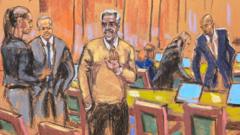Why Did Sean Diddy's Attorneys Wrap Up Their Defense in Just 20 Minutes?

Understanding the Legal Proceedings of Sean "Diddy" Combs' Sex Trafficking Trial
The recent trial of Sean "Diddy" Combs has garnered significant media attention, highlighting not only the allegations against the hip-hop mogul but also the complex dynamics of the legal system. Combs, who has pleaded not guilty to serious charges of sex trafficking, racketeering, and transportation for prostitution, faced federal prosecution in New York. The prosecution's case was extensive, lasting nearly seven weeks and involving testimonies from over 30 witnesses. In stark contrast, the defense's case was brief, lasting only about 20 minutes. As the trial progresses, it's essential to delve deeper into the implications of these allegations, the legal strategies employed by both sides, and the broader context of sex trafficking in today's society.
Overview of the Charges Against Sean Combs
Sean Combs stands accused of running a criminal enterprise that allegedly leveraged his celebrity status and business empire to facilitate sex trafficking. The charges include:
- Sex Trafficking: This involves recruiting, harboring, or transporting individuals for the purpose of sexual exploitation.
- Racketeering: This charge suggests involvement in organized crime, indicating that Combs may have orchestrated illegal activities as part of a larger criminal enterprise.
- Transportation to Engage in Prostitution: This charge pertains to the movement of individuals across state lines for the purpose of engaging in sexual activities for hire.
If convicted, Combs faces a potential life sentence, making the stakes extraordinarily high not just for him but also for the broader implications regarding celebrity accountability and the fight against sex trafficking.
The Prosecution's Strategy: Building the Case
As the prosecution presented its case, they aimed to paint a picture of Combs as a manipulative figure who exploited vulnerable women. Over seven weeks, the prosecution called numerous witnesses, providing testimonies that suggested a pattern of coercion and abuse. Key components of their strategy included:
- Witness Testimonies: More than 30 witnesses, including alleged victims and associates, shared their accounts of Combs' behavior, painting a picture of a toxic environment where women felt pressured to comply with his demands.
- Evidence of Coercion: Prosecutors argued that Combs used drugs, violence, and manipulation to control these women, asserting that their relationships with him were marked by intimidation rather than consent.
- Documentary Evidence: The prosecution likely presented various forms of evidence, including communications, to substantiate their claims of wrongdoing and to highlight the alleged criminal enterprise.
The Defense's Approach: A Brief but Strategic Case
In contrast to the prosecution's lengthy presentation, Combs' defense team opted for a succinct approach, resting their case after only 20 minutes. Their strategy involved:
- Quick Presentation: The defense presented messages from Combs to ex-girlfriends, aiming to illustrate that these relationships involved mutual consent rather than coercion. The defense emphasized the nature of their interactions, labeling them as "freak-offs" or "hotel nights," which the alleged victims described as enjoyable experiences.
- No Witnesses Called: The defense decided not to call any witnesses, including Combs himself, which can often be a tactical decision in legal proceedings. The risk of introducing new evidence or testimony that could backfire may have influenced this choice.
- Legal Arguments for Acquittal: Combs' lawyers filed a motion for acquittal, arguing that the prosecution failed to meet the burden of proof required to sustain the charges. They contended that the alleged victims were capable individuals who could have left the situation if they wished.
The Importance of Celebrity Trials in Addressing Social Issues
High-profile cases like that of Sean Combs shine a spotlight on critical social issues, particularly the pervasive problem of sex trafficking. These trials serve as a means to address not only individual accountability but also broader societal structures that can enable such behavior. The implications of this trial extend beyond Combs himself, as they contribute to ongoing discussions about:
- Accountability for the Powerful: Celebrity trials raise questions about whether individuals in positions of power are held to the same standards as the general public. The outcome of such cases can influence public perception and expectations of accountability.
- Victim Advocacy: The trial brings attention to the voices of victims in sex trafficking cases. It emphasizes the importance of believing and supporting those who come forward with allegations of abuse and exploitation.
- Awareness and Prevention: Public interest in high-profile trials can lead to increased awareness about the realities of sex trafficking, prompting discussions on prevention, resources for victims, and legal reforms.
What Lies Ahead: The Closing Arguments and Potential Outcomes
As the trial approaches its conclusion, the focus will shift to closing arguments from both sides. These statements are pivotal, as they summarize the evidence presented and aim to persuade the jury. The defense will likely reiterate their claims regarding the lack of evidence for coercion and the consensual nature of the interactions. In contrast, the prosecution will emphasize the testimonies and evidence that point to a systematic pattern of abuse.
The jury's decision will be influenced by various factors, including the credibility of witnesses, the strength of the evidence, and the effectiveness of the arguments presented during closing statements. Regardless of the outcome, this trial underscores the critical importance of addressing issues of consent, power dynamics, and accountability in society.
Frequently Asked Questions
What are the potential legal consequences for Sean Combs if convicted?
If convicted on all charges, Sean Combs could face a life sentence in prison. The severity of the charges, including sex trafficking and racketeering, carry significant penalties under federal law.
Why did Sean Combs choose not to testify in his own defense?
The decision not to testify can be a strategic move by defense attorneys. They may have concluded that the risks associated with Combs taking the stand, including potential cross-examination challenges, outweighed the benefits of his testimony.
What is the role of celebrity status in trials like this?
Celebrity status can complicate legal proceedings, as it often attracts more media attention and public scrutiny. This can influence jury perceptions and the overall dynamics of the trial.
Final Thoughts
The trial of Sean "Diddy" Combs serves as a crucial case study in the intersection of celebrity culture and serious criminal allegations. As the legal proceedings unfold, they not only aim to determine Combs' guilt or innocence but also contribute to a broader dialogue on issues of power, consent, and accountability in society. The outcome of this trial will resonate far beyond the courtroom, influencing perceptions of justice and the fight against sex trafficking. As we await the final verdict, one must ponder: how can society better support victims of trafficking and hold perpetrators accountable?
#DiddyTrial #SexTraffickingAwareness #JusticeForVictims
Published: 2025-06-24 22:04:05 | Category: wales



